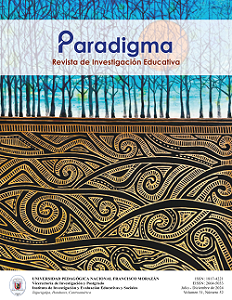Application of question-based learning in the FA-0230 course of the Bachelor of Pharmacy at the Universidad de Costa Rica
DOI:
https://doi.org/10.5377/paradigma.v31i52.19503Keywords:
question-based learning, pharmacy, pharmaceutical biotechnology, university studentsAbstract
In the course of Fundamentals of Pharmaceutical Biotechnology (FA-0230) for the Bachelor’s Degree in Pharmacy offered at the Universidad de Costa Rica, necessary measures against COVID-19 were implemented in 2022 to ensure that classes were conducted in person. A question-based learning approach was chosen for the topic on monoclonal antibodies. The objective is to present the academic and student experience of this learning from March to July 2022, corresponding to the first semester of in-person classes after two years of virtual education. In the first class on this topic, each work team was asked to create a questionnaire about aspects they considered relevant to include in the exam evaluating this subject, upon completion of the lectures. Subsequently, each team submitted their questions to the instructor, who compiled a single document and shared it through the course's digital platform. At the end of the course, a questionnaire was administered to gather feedback on the teaching strategy used. In the academic evaluation, the average score was 80/100. Positive feedback from the students indicated a better understanding of the information they needed to comprehend for the exam, earlier study habits, and a sense of being active participants in their learning.
Downloads
178
Downloads
Published
How to Cite
Issue
Section
License
Copyright (c) 2024 Universidad Pedagógica Nacional Francisco Morazán

This work is licensed under a Creative Commons Attribution-NonCommercial-NoDerivatives 4.0 International License.
Transfer of Copyright
- The author, when sending the work, states that it is his will to give the Universidad Pedagógica Nacional Francisco Morazán the patrimonial rights that correspond to him as the author of his work.
- The rights here assigned include all economic rights (Reproduction, transformation, public communication and distribution) and are given without limitation in terms of territory; This Assignment is given for the entire duration term established in the current legislation in Honduras.
- The cession of the aforementioned rights does not imply the cession of moral rights over it, because in accordance with the provisions of the Copyright and Related Rights Law, Chapter II, of the Moral Rights, Article 34, Article 25 , these rights are inalienable, imprescriptible, indefeasible and inalienable.
- The research work or document must be original and have been done without violating or usurping rights of third parties, therefore, the work is exclusively authored and owns the same.
- In the case of any claim or action by a third party, as to copyright on the work in question, the author must assume full responsibility for the rights assigned.
- Upon completion of the Rights Assignment Form, the author states that the work has not been published in another way, that the rights on the work have not been assigned and that no encumbrance or limitation on their use or use is imposed on them.





